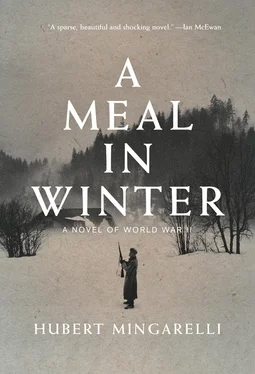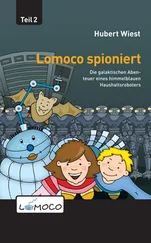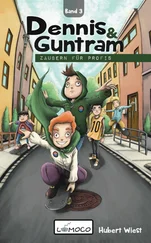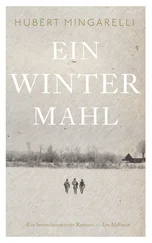Hubert Mingarelli
A Meal in Winter
THEY HAD RUNG the iron gong outside and it was still echoing, at first for real in the courtyard, and then, for a longer time, inside our heads. We would not hear it again. We had to get up straight away. Lieutenant Graaf never had to ring the iron twice. A meagre light came through the frost-covered window. Emmerich was sleeping on his side. Bauer woke him. It was late afternoon, but Emmerich thought it was morning. He sat up on his bed and looked at his boots, seeming not to understand why he’d slept in them all night.
In the meantime, Bauer and I had already put our boots on. Emmerich got up and went to look through the window, but he couldn’t see anything because of the frost, so he kept on struggling to disentangle night from day. Bauer explained to him that it was afternoon and Graaf was calling us.
‘What, again?’ Emmerich groaned. ‘What for? So we can freeze to death?’
‘Hurry up,’ I told him.
‘You’re kidding,’ Emmerich replied. ‘Why should I hurry just so I can freeze while I’m standing to attention?’
We felt the same way as him. The whole company did. Why did Lieutenant Graaf need to muster us outside? Wasn’t he afraid of the cold, like we were? We could just as easily have heard what he had to say standing by our camp beds here in the warm. Presumably he didn’t think it was formal enough, talking to us inside a gymnasium. He’d had a piece of old iron hung from a telephone pole, and we hated the noise it made when it was rung, that sinister chime, even more than the cold that awaited us outside. We had no choice — we obeyed orders — but all the same, it took courage to go out in weather like that.
We had put on our coats, and wound our scarves several times around our necks, tying them behind. Next came the wool balaclava. Completely covered except for our eyes, we went out into the gymnasium courtyard. Bauer, Emmerich and I were the last ones out there.
We were used to it, we knew what to expect, and yet the cold always came as a shock. It seemed as if it entered through your eyes and spread through your whole body, like icy water pouring through two holes. The others were already there, lined up and shivering. While we found our places among them, they hissed at us that we were arseholes for making the whole company wait like that. We said nothing. We got in line. And, when everyone had stopped shuffling their feet to get warm, Graaf, our lieutenant, told us that there would be more arrivals that day, but late probably, so the work was scheduled for the following day, and that this time our company would be taking care of it. I had the same thought as everyone else: was that all? Couldn’t he have told us that inside?
Graaf could not tell how it made us feel to know that there would be more arrivals that day. He couldn’t see if we were whispering behind our scarves. All he could see was our eyes. And from that distance, he could not yet guess who would report sick the following day.
He hadn’t told us how many were coming. He knew it made a difference to us, that it was important. Because if a lot came, he worried that we’d start reporting sick that night.
He nodded, turned around, and went to the officers’ mess.
We could have broken rank now and gone back inside, but we didn’t. We stayed where we were. Earlier, we would have given almost anything not to have to go outside, and yet we waited before returning to the warm. Perhaps it was because of the work that awaited us the following day. Or because we were already frozen inside, so a few minutes more made no difference.
Now they were outside anyway, the soldiers in charge of the stove that night took the opportunity to fill their buckets with coal. Bauer and I were looking over at the officers’ mess because apparently they had a bathtub. We’d been talking about it when the iron sounded. I told Bauer that, in the old days, I’d saved up to have a bathtub fitted. We often used that phrase. We often said ‘in the old days’, partly as a joke, but not entirely. Emmerich came towards us. He tried not to show us his distress. He had dark rings around his eyes from sleeping during the day.
We went back inside, and sat on Bauer’s bed. We didn’t talk about the work that awaited us the next day. But because we didn’t talk about it, we felt the pressure of it building inside us.
THAT EVENING, WE asked to see our base commander. What else could we do? We were able to go over Graaf’s head because he’d left to see an acquaintance in town — thankfully, as I doubt he’d have let us do it otherwise. The base commander looked away as he listened to us, his hands fidgeting in his pockets as though he were searching for something. We didn’t hold back when we spoke to him. He was a bit older than us. In civilian life, he bought and sold fabric in bulk. It was difficult for us to imagine that, though, because for us he had always been some sort of commander.
We weren’t telling him anything he didn’t already know. Occasionally he would glance towards the door, or give quick little nods. Not because he was in a rush, but because he understood us. We exaggerated a little bit, of course. Here, if you wanted an inch, you always had to ask for a mile. If the cook were to start being a bit stingy with his portions, for example, we would have to say that we were starving to death, otherwise nothing would ever change.
That evening, what we had to say was more important, and our commander gave those occasional nods to show he understood this. We explained to him that we would rather do the hunting than the shootings. We told him we didn’t like the shootings: that doing it made us feel bad at the time and gave us bad dreams at night. When we woke in the morning, we felt down as soon as we started thinking about it, and if it went on like this, soon we wouldn’t be able to stand it at all — and if it ended up making us ill, we’d be no use to anybody. We would not have spoken like that, so openly and frankly, to another commander. He was a reservist like we were, and he slept on a camp bed too. But the killings had aged him more than they had us. He’d lost weight and sometimes he looked so distraught that we feared he would fall ill before we did and that another, less understanding commander would be appointed in his place: someone we didn’t know, or — worse, perhaps — someone we did know. Because it could easily be Graaf, our lieutenant. He didn’t sleep on a camp bed. He took good care of himself, but not of us. With him in charge, there would be less coal and more marching. With Graaf, we would be ceaselessly filing in and out of the base. When we thought about this, we could hear the iron echoing from dawn till dusk. It went without saying that we liked our commander, no matter how distraught he was.
As usual, he gave us what we asked for, and we left the next morning — Emmerich, Bauer and myself. We went at dawn, before the first shootings. That meant missing breakfast, but it also meant not having to face Graaf, who would be filled with hatred that we had gone over his head. It was still dark, and everything was frozen. The road was harder than stone. We walked for a long time without stopping — in the cold air, under the frozen sky — but we weren’t unhappy, in spite of that.
And it was as though I’d lied to the commander the previous evening, because that night, for once, I didn’t dream about our life here. I dreamed that Emmerich, Bauer and I took a tram together. It was a perfectly simple dream, but extraordinary for that very reason. The three of us were sitting, and around us all was peaceful and — in contrast with most dreams — entirely realistic. There was nothing to suggest it was false, that the scene existed only in my mind.
Читать дальше












